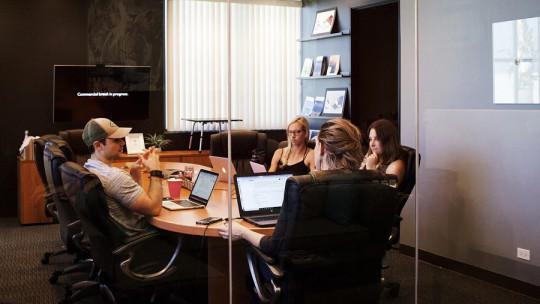In the work environment, certain types of potentially conflictive circumstances usually arise.
In this article we are going to see some Practical tips on how to properly resolve conflicts at work so that these do not become a problem that threatens our continuity of work in said position.
9 tips to resolve labor conflicts
In the following lines we are going to see a list of practical suggestions to know how to resolve conflicts at work and maintain a more adaptive work environment.
1. It is not necessary to be friends with your coworkers
This first piece of advice refers to the fact that labor relations They do not necessarily have to transcend a personal friendship ; In some cases, professionals try to force this situation, which results in incendiary conflicts within the work environment.
The ideal is to understand the difference between the different roles we play at certain times; When we are in our work environment, we are exercising a professional role that focuses on the fulfillment of our work activities. The treatment must be cordial, but the relationship must not be passed off as what it is not
2. Work communication
An aspect that is quite positive when resolving conflicts at work is maintain adequate communication with our colleagues, including our bosses Keeping quiet when we don’t like something can result in major complications, since it encourages problems to accumulate in teamwork dynamics.
The best thing will always be to express our points of view on certain situations that may be happening and are not to our liking, doing so in a polite manner and without generating conflicts with our speech (assertive communication).
3. Identify the conflict
It may happen that we feel uncomfortable in our work environment, but we do not know for sure the reason for this climate of hostility.
When this happens, we must dedicate time to carry out an introspection exercise so that we can find the cause of our discomfort by making a conscious evaluation of some personal aspects that we had not previously considered.
4. Implement active listening
Regardless of the conflict we may have, or our work environment, practicing active listening always helps to resolve conflicts When we listen conscientiously to what others have to say, we are closer to finding solutions to conflicts.
We must not let emotions and impulses limit our ability to listen to others. Even though in some cases others are not using correct language, it is best that we control ourselves in the situation and interpret what the underlying message that the other person is trying to express is.
5. Use trained mediators
In some circumstances it is best to seek the help of a mediator who has the skills and character necessary to provide support in the face of labor conflict. When you are able to recognize that you need help and seek it, conflicts become smaller.
We will not always have the possibility of resolving on our own all the conflictive situations that arise at work; in some cases it is best to be humble and ask for the collaboration of a colleague who is willing and available to help us.
6. Promote practical thinking
Practical thinking usually helps a lot to prevent labor conflicts from arising. People who use this type of thinking tend to stay away from situations where they may be involved in enmities and censary hostilities Basically they don’t get involved where they don’t really need to get involved.
It is not about being a limited person, but about better evaluating the situations in our work environment and determining where it is appropriate to get involved and where it is not so appropriate.
7. Make good use of body language
Our body transmits our sensations in an often unconscious way; That is why we must learn to handle it correctly. It could happen that although we are not expressing our discomfort in words, it can be evident in our body language.
It is a situation that generally favors conflict with other people, taking into consideration that others do not know the reason for our bodily expression and could come to think that it has something to do with them.
8. Learn to think collectively
Although we are people with individualistic traits, within our work environment We must adapt to thinking in a broader context than our interests and particular needs.
In most cases, when you have a job it is necessary to participate collectively to achieve the stated objectives. Pretending that we can impose our needs above those of others will inevitably create uncomfortable situations for us at some point.
That is why the most appropriate thing would be to get used to thinking collectively and understand that everyone has the right to a pleasant and functional work environment with the possibility of expressing themselves in a timely manner and being taken into account.
9. Avoid the fight of egos
Conflict resolution is not about fighting to see who is right and making it clear to everyone that the other was wrong; On the contrary, we must look for a lowest common denominator, something that does not leave parties humiliated and that is not based on constant reproaches. Therefore, we must put common interests first and not use dialogue and negotiation sessions as a way to vent.









